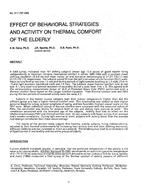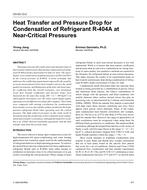Heat-transfer experiments were conducted on apparel fabrics to ascertain the effects of fabric characteristics and spatial configurations on thermal comfort. Each test was made at three different combinations of temperature and relative humidity on single fabrics and spaced combinations of jacket and shirt fabrics. Saturated salt solutions were used to maintain a constant relative humidity. Results of the study indicate that the layering of the fabrics is the most significant factor in thermal insulation for the fabrics under investigation; insulation increases with an increase in airspace. The temperature-relative humidity differential was also a significant factor in providing insulation. Fabric thickness was found to be the only statistically significant physical property under the prescribed conditions. A qualitative analysis of fabric surface indicated that the surface hairiness could possibly be a contributing factor in insulation value.
Citation: ASHRAE Transactions, 1983, vol. 89, pt. 2A, Washington, D.C.
Product Details
- Published:
- 1983
- Number of Pages:
- 8
- File Size:
- 1 file , 610 KB
- Product Code(s):
- D-DC-2782


